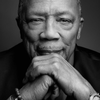Let’s Revisit Quincy Jones’ Legendary Appearance on Stretch and Bob’s College Hip-Hop Radio Show
Uncle Q showed up faded and took questions from callers, including Q-Tip, on that fateful night in 1996.

Uncle Q showed up faded and took questions from callers, including Q-Tip, on that fateful night in 1996.
